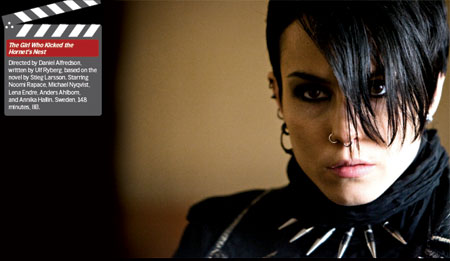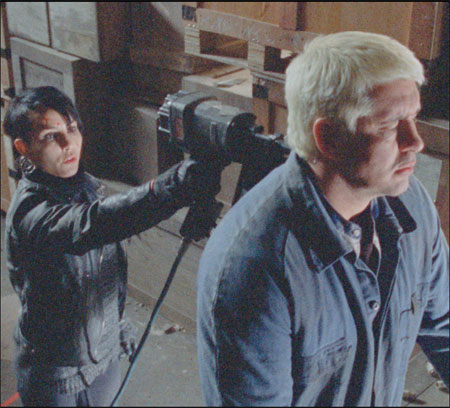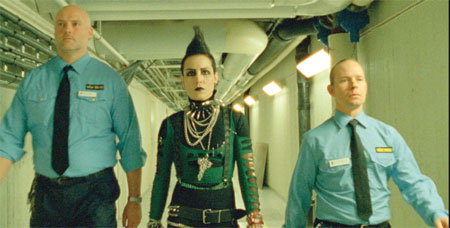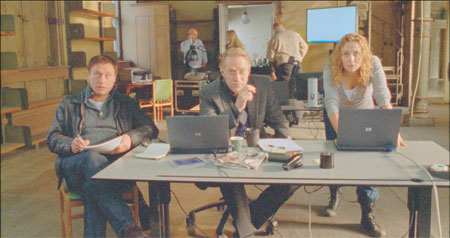Millennium finally comes to a long, wheezy end
Updated: 2011-01-15 07:49
By Elizabeth Kerr(HK Edition)
|
|||||||||
|
Lisbeth (Noomi Rapace) finally has it out with her freakishly unfeeling half-brother Ronald Niedermann (Micke Spreitz) in one of The Girl Who Kicked the Hornet's Nest's more creative sequences |
|
Lisbeth Salander (Noomi Rapace) decides to send a message to the state about how she feels about it in Steig Larsson's The Girl Who Kicked the Hornet's Nest, the blessed conclusion to the first version of the author's Millennium Trilogy films |
|
Mikael (Michael Nyqvist, far left) gets help from some equally anti-corruption crusading government types in The Girl Who Kicked the Hornet's Nest |

Next up for Larsson's literary juggernaut is the Americanized version. Elizabeth Kerr reports.
It's been discussed in this space before. What is the point of an English-language remake, or the other way around, of a film? Is it to cash in on an overseas box office hit that, with the right tweaks, can work elsewhere? Is it to pad out creatively bankrupt cinema industries? Is it because there's a fundamental theme or subject that speaks to all of us everywhere, and if given the right translation - not in words, but in images and impressions - will connect with audiences that were not the original target? All of the above?
When it comes to Hollywood, the cynical answer is cash. Had Avatar been, oh, say, a Dutch film you can bet someone would be in boardroom trying to figure out how to re-do it in English. With lots of explosions. Infernal Affairs was one of the cleverest, sleekest crime thrillers to come out of Hong Kong in a very long time, and Martin Scorsese found it a perfect complement to his own urban drama philosophy. Not only was that a matter of "Kaching", it finally won the (mostly) great filmmaker his only Oscar.
Stieg Larsson's final episode in Millennium Trilogy was probably this past Christmas' single most gifted book, an allegedly game-changing noir thriller that turned pulp conventions on their heads and redefined the genre. In the spirit of full editorial disclosure, I'll admit that I got about 140 pages into the novel before the urge to use it as litter box liner overtook me. Despite what Larsson's estate has publicly said (mostly his partner of 20 years), the book does not, in fact, read as the anti-violence treatise they claim it is. It exploits, for sordid thrills, the very notions it allegedly condemns and (based on the films) the entire unwieldy story hinges on a vicious - and graphic - rape of a woman who's supposed to be about 5' 2". Her backstory is one of misery, perpetual subjugation, and voicelessness.
David Fincher (Zodiac, Fight Club, Oscar front-runner The Social Network) has dealt with the same core themes in most of his films: obsession, identity, and the human propensity to violence. He's at the helm of the currently shooting English-language, Swedish-accented (whatever that means), Stockholm-set Hollywood makeover of Larsson's first chapter, The Girl with the Dragon Tattoo. Is this going to be a case of Fincher and writer Steven Zaillian reinterpreting the text and finding a way to tell the same story without the unsavory misogynist aftertaste? Do they need to make it more "American," and if so, what does that mean? Or is this just going to be another excuse for pointless abuse of women - with some lesbian sex thrown in for good measure? Because that's what this final Swedish installment is (though the lesbians were in part two).
The Girl Who Kicked the Hornet's Nest picks up about half an hour after Played with Fire ended. In other words, Lisbeth Salander (the devastatingly overrated Noomi Rapace) is in the midst of being airlifted to hospital in Goteborg after her showdown with gangster-father Zalachenko (Georgi Staykov), wherein she was stabbed, shot, humiliated and left to lie in the mud until her constant rescuer, the oh-so-manly crusading journalist Mikael Blomkvist (Michael Nyqvist) arrived on the scene. Deciding the injustices Lisbeth has endured need to be addressed and the perpetrators of the crimes against her punished, Mikael directs his magazine crew to ready an issue devoted to her. It's going to be a 75-page feature (!) that names names and takes no prisoners, no matter how far the story reaches into the halls of power. Etcetera. The film concludes with Lisbeth's trial - with no jury and no direct questions posed by either prosecution or defense, evidently proselytizing is the nature of Swedish jurisprudence - for attempted murder in the decade's least thrilling courtroom thriller.
Hornet's Nest has the same lurid eye for violence against women as it predecessors but thankfully this time eases up on the graphic displays of it. Lisbeth's rape comes up yet again, in full Technicolor, and we're subjected to the visuals of it once more, but it's a short stretch during her trial. There's not much pedestrian director Daniel Alfredson can do with the material anyway, seeing as Lisbeth spends the first hour in a hospital bed and the "action" doesn't pick up until she's sent back to Stockholm. Then she spends the rest of the time in a jail cell. Scintillating cinema.
Hornet's Nest fails on so many levels it's difficult to itemize them all - but the most ridiculous conceit has to be Mikael's planned 75-page expos, a bit of outrageousness anyone who's worked in publishing will recognize as such. The crux of the story is in Lisbeth's "empowerment", and her ultimate vindication, but there's hardly a time where she exerts any agency of her own. Mikael gets her a lawyer. Mikael wins her public support. She's surrounded by the most corrupt male-dominated state services of all time (so much for Sweden's vaunted socialist reputation), which are in collusion with each other to keep her silent. Lisbeth is at the heart of a ridiculously important national security something-or-other (an element of the larger convoluted story) and every other woman in the film falls under the sway of Male Evil at some point too. After three films, the sum total is a series rooted in male fantasy that ironically supports the central conceits.
That's the line at which Millennium's story, already stretch so thin, finally snaps. So the question becomes one of why we would want to see another six hours of it. Maybe something was lost in translation and there's a kernel of some sort of truth that can be extracted from this mess. Here's hoping Fincher gets it right and knows what to retain, what to toss out, and what kind of details - details Alfredson et al ignore - make a story with characters we can invest ourselves in. You can tell me all about it. I couldn't care less at this point.
The Girl Who Kicked the Hornet's Nest opened in Hong Kong on Thursday.
(HK Edition 01/15/2011 page4)


